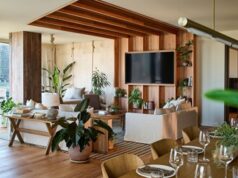NATIONAL REPORT—Approximately 73% of travelers are more likely to select accommodation that implements sustainability practices so if you have a hotel or B&B you’d like to take to the next level, then ensuring it is as eco-friendly as possible is vital. When it comes to sustainability in the sector, it is all a matter of making the most of your possibilities. Resorts with gardens and a wish to grow their own food can create a permaculture garden, which is a long-term project that requires reliance on expert knowledge and various years to complete. However, even small boutique hotels can do their share to implement strategies that can help their gardens become more self-sufficient and less costly to run.
The Importance of Seeking Professional Help
When it comes to larger-scale or commercial landscaping projects, relying on experts in aspects such as water-saving irrigation maintenance systems and landscape enhancement for better water saving is key. In rainy zones like Orlando a good landscaping system can help you retain enough water to satisfy your garden needs. However, even in dryer cities, the design and tilt of your land can do plenty to avoid rainwater runoff and loss. A good landscape management plan can make a big difference in your ability to include features such as permaculture ponds, water recycling systems, and other features that can save on water expenditure. It can also help you dedicate part of your land to growing produce that can serve to feed guests at the hotel restaurant.
Embracing Natural Energy
The essence of permaculture is to “waste not, want not.” Hotels that embrace this philosophy aim to be as self-sufficient as possible, relying on renewable resources and self-sustaining ecosystems. If you’ve been thinking of installing solar panels, now is a great time to do so. As stated by Hotel Management, some hotels are relying on solar to make savings of over $1,500 in energy costs and earning approximately $16,000 in renewable energy credits.
Reducing Water Use
Hotels across the globe are doing their share to save water by installing low flow taps and showers/aerators and by reducing the amount of water used to flush toilets. However, much more can be done. For instance, harvesting rainwater can reduce water consumption by 30 percent, while gray water recycling can save up to 40 percent. The rainwater system is simple to run and highly efficient. It involves collecting and filtering water, then feeding it back to the hotel via an efficient treatment system that ensures that clean water can be used for purposes like flushing toilets, watering plants, and washing hotel equipment.
Improving Biodiversity
Permaculture seeks to improve wildlife diversity and that means that during the planning stages of your hotel gardens and green areas, you should prioritize native plants that will invite small wildlife, bees, butterflies, and other helpful insects. A wildlife-friendly garden will fit right into tourists’ current idealization of boho-chic gardens and public spaces. In this type of garden, grass grows a little taller, flowers of various species grow at different heights, and the effect is one of wild beauty that is still well-kept thanks to frequent gardening and maintenance. This type of garden also has bird boxes, wild ponds, and other features that can add life and color to spaces and give guests a place to relax, unwind, and discover the carefully manicured wilderness.
Permaculture is a complex philosophy that ranges from composting to relying on natural energy. While creating a permaculture garden in your hotel can take years, there are many ways to head towards your goal in an immediately impactful manner. These include relying on natural energy, planting wildlife gardens, and designing your landscaping in such a way that you can collect and reuse rainwater.







